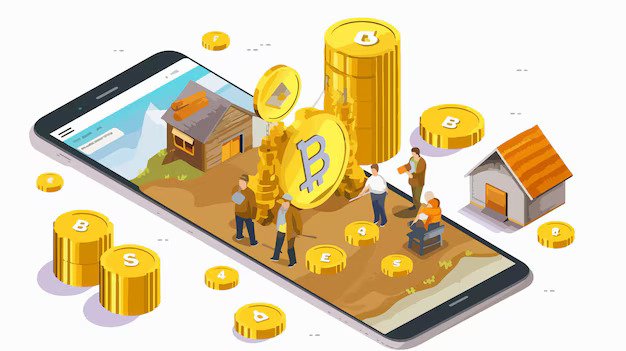
Real estate tokenization is transforming how people invest in property by bringing the advantages of blockchain technology to an established market. The approach breaks down barriers that previously limited property investments, making it easier, faster, and more secure for investors to participate. In this guide, we’ll explore what real estate tokenization is, its benefits, and how investors can engage in this new form of property investment. We’ll also look at how crypto token development services support tokenized real estate projects and make investing accessible to a wider audience.
What Is Real Estate Tokenization?
Real estate tokenization involves converting a property into digital tokens on a blockchain, where each token represents a fractional ownership stake. Blockchain technology allows ownership to be represented digitally, recorded securely, and easily transferred. By tokenizing real estate, property owners make it possible for investors to buy, sell, or trade fractional shares of the property rather than the entire asset.
This approach enables multiple investors to own small portions of a single property, which would be difficult or costly through traditional methods. Tokenized real estate is managed through crypto token development services that ensure each token aligns with the underlying property, enabling smart contracts, automated transactions, and secure records.
How Does Real Estate Tokenization Work?
Real estate tokenization begins with selecting a property, such as residential, commercial, or industrial real estate. The property is then divided into shares, and each share is represented by a token on a blockchain. These tokens can be bought or sold, just like shares of a stock.
- Property Selection: Owners choose a property for tokenization, often focusing on high-value properties like office buildings or apartment complexes. This property becomes the underlying asset of the tokens.
- Token Creation: Using crypto token development services, the property’s shares are minted into tokens that represent fractional ownership.
- Smart Contract Setup: A smart contract is created to govern each token’s rights and rules. For example, it might outline the owner’s rights, dividend distribution, and transfer rules.
- Token Sale: Investors purchase these tokens, gaining partial ownership in the property. The tokens can be listed on specialized trading platforms where owners buy, sell, or trade them like stocks.
- Ownership and Dividends: Investors receive income from property rentals, appreciation, or sales, with income distributed according to token ownership.
This process allows investors to gain property exposure without full ownership or property management responsibilities. Crypto token development services handle the technical setup and ensure that each token remains secure and represents actual property ownership.
Benefits of Tokenized Real Estate
Tokenizing real estate brings multiple benefits to both investors and property owners. Here’s why it’s an attractive option:
1. Increased Accessibility
Tokenization allows investors to purchase small portions of a high-value property, lowering the entry barrier. Previously, direct real estate investment required substantial capital, but tokenized properties allow for micro-investments. With fractional ownership, investors can start small and still enjoy the benefits of real estate.
2. Enhanced Liquidity
Real estate is typically considered an illiquid asset because buying or selling a property takes time and effort. Tokenization changes this, as tokenized shares can be traded on blockchain marketplaces. Token owners can sell or buy tokens quickly, creating liquidity similar to stocks, a rarity in real estate investing.
3. Simplified Transactions and Reduced Fees
Blockchain transactions are fast and secure, reducing the need for intermediaries like brokers and banks. This reduces transaction costs, which often include agent fees, processing fees, and other hidden charges in traditional real estate.
4. Transparent Ownership and Secure Records
Blockchain ensures transparency and security in ownership records. Each transaction is recorded on the blockchain, which is immutable and accessible to all parties involved. Investors have full confidence in their ownership rights, and issues around fraud and ownership disputes are minimized.
5. Diversification Opportunities
Real estate tokenization lets investors diversify their portfolios easily. By owning tokens across different properties, investors can reduce risk and gain exposure to various types of real estate, including residential, commercial, and industrial properties. Tokenization provides flexibility that traditional real estate investments lack.
6. Opportunities for Passive Income
For properties that generate rental income, token holders can earn passive income. The income is typically distributed in proportion to the ownership represented by each token. This makes it easier for investors to gain steady returns without managing the property directly.
Understanding Smart Ownership in Real Estate
Smart ownership refers to the streamlined, technology-driven ownership experience enabled by tokenized real estate. Instead of traditional deeds and cumbersome legal documentation, tokenized ownership leverages smart contracts. These contracts automate and secure ownership transfers, rent distribution, and record-keeping.
Smart Ownership Advantages:
- Automated Processes: With smart contracts, actions like transferring ownership or distributing income are automated, making the process quicker and more reliable.
- Reduced Paperwork: Traditional real estate involves extensive paperwork and legal processes, whereas smart ownership on the blockchain eliminates many manual tasks, making the process simpler.
- Transparent Ownership Records: Blockchain keeps ownership records transparent and tamper-proof, eliminating concerns about mismanagement or inaccurate records.
Smart ownership combines real estate and technology for a seamless investment experience, and crypto token development services can provide the technical support needed for secure and efficient token creation and management.
Steps to Tokenize Real Estate
Tokenizing a property involves several key steps that ensure tokens are accurately linked to the underlying real estate. Here’s an outline of the process:
1. Property Valuation and Structuring
The first step is determining the value of the property, which establishes how many tokens will be issued. Property owners work with token development teams to decide the structure, such as the number of tokens, individual token values, and any added benefits like voting rights or dividend options.
2. Legal Compliance
Real estate tokenization must comply with local regulations, as ownership tokens are often classified as securities. Legal frameworks determine how these tokens can be sold and traded, ensuring protection for investors. Working with legal professionals is essential to ensure compliance with securities and property laws.
3. Token Development and Smart Contract Design
Using crypto token development services, a token is created that represents ownership in the property. Smart contracts are then coded to enforce the rules around each token’s usage, ensuring automated transactions and ownership rights.
4. Platform Listing and Token Sale
Tokens are listed on blockchain-based platforms or real estate tokenization marketplaces, making them available to investors. The tokens can be sold through an Initial Coin Offering (ICO) or Security Token Offering (STO), depending on regulations. These tokens can then be traded on secondary markets, giving investors the flexibility to buy and sell tokens at will.
Real Estate Tokenization Projects: Real-World Applications
Several successful real estate tokenization projects have demonstrated how this technology can work in real-world settings. These projects cover diverse property types and showcase how tokenized real estate can benefit different sectors:
- Commercial Properties: Tokenized commercial properties provide small-scale investors with exposure to high-value office buildings, retail spaces, and business centres. This allows them to invest in valuable locations without owning an entire building.
- Residential Real Estate: Tokenized apartments and residential complexes allow more people to participate in the residential property market. Investors can receive rental income and benefit from property appreciation over time.
- Vacation Rentals: Tokenizing vacation rentals enables investors to profit from short-term rentals without managing the properties themselves. Rental income is distributed to token holders, creating passive income from popular tourist locations.
- Luxury Properties: High-net-worth investors often look for diversification options in luxury properties. Tokenization allows them to invest in exclusive real estate without committing a significant amount of capital.
Each of these projects shows how property tokenization can enhance access and flexibility. With the support of crypto token development services, real estate projects continue to expand, bringing innovation to the market.
Key Challenges in Real Estate Tokenization
While the advantages of tokenizing real estate are numerous, there are challenges that investors and property owners should consider:
- Regulatory Complexity: The tokenization of real estate is subject to various securities and property regulations. Navigating these can be complex, as they vary by country and even within states. Legal guidance is essential.
- Market Volatility: The value of tokenized assets may fluctuate, especially in the early stages of adoption. Market demand can influence token prices, affecting overall investment stability.
- Technical Security: Security is a significant concern when dealing with blockchain technology. Smart contracts must be well-audited to prevent breaches, and crypto token development services should focus on creating secure environments for token transactions.
- Liquidity Risks: Although tokenization promises liquidity, some markets may have limited buyers, which can make it difficult for investors to sell their tokens at desired prices.
- Education and Awareness: Many potential investors are unfamiliar with blockchain or tokenization. Educating investors about tokenized real estate’s benefits and risks can increase adoption.
Despite these challenges, real estate tokenization is steadily growing. With the support of reliable crypto token development services and market demand for innovative investment solutions, the industry is poised for continued growth.
Conclusion:
Real estate tokenization simplifies investing in property, offering accessibility, transparency, and liquidity in ways that traditional methods do not. By leveraging blockchain, property tokenization allows investors to participate in real estate without the high entry barriers typically associated with property ownership.
For investors seeking to diversify and access passive income opportunities, tokenized real estate opens up new options. Crypto token development enables the secure, transparent, and flexible management of these investments, making tokenized real estate a viable option for those interested in blockchain-backed assets.
If you’re considering taking the next step toward digital asset creation, you might want to explore how to Create Own Crypto Token to tap into the broader possibilities of tokenization and blockchain-backed assets. Whether for real estate or other asset classes, tokenization is transforming how we think about and invest in the future of property ownership.

